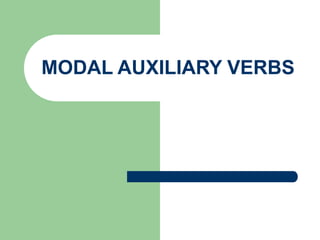
Presentación resumen de los verbos modales
- 2. Pay attention to this: No change in form: no –s in 3rd person singular (except “HAVE TO” or “BE ABLE TO”) No “DO” in negatives or questions (except “HAVE TO”) No infinitive Followed by infinitive without “TO” (except OUGHT TO, HAVE TO, USED TO)
- 3. ABILITY Past Present Future COULD WAS ABLE TO COULDN’T CAN CAN’T WILL BE ABLE TO WON’T BE ABLE TO When I was a child I could jump very high. I was able to finish my task. I couldn’t mend your bike. She can speak 5 languages. I can’t ride a horse. I will be able to swim soon. I won’t be able to come tomorrow.
- 4. POSSIBILITY MAY MIGHT CAN COULD It may rain tomorrow. He might be ill. He’s not here. He could be at home, I guess. Andalucía can be really hot in summer
- 5. PERMISSION Past Present COULD WAS ALLOWED TO COULDN’T CAN / COULD BE ALLOWED TO MAY / MIGHT (formal) CAN’T When I was 16 I could go out at night. She was allowed to stay out late. I couldn’t go out yesterday. I was punished. You can leave the room when you finish. Could I ask you a question? You are not allowed to smoke here. May I come in? Might I see the exam, sir? She can’t go out until she finishes her tasks.
- 6. OBLIGATION Past Present Future HAD TO DIDN’T HAVE TO MUST HAVE TO HAVE GOT TO (informal) NEEDN’T DON’T HAVE TO WILL HAVE TO WON’T HAVE TO When I was a child I had to work a lot. Last year I didn’t have to study so much. You must get up earlier. She has to work every day. I’ve got to go. See you! You needn’t come so early. I don’t have to work on Sundays. You will have to work hard there. I won’t have to come tomorrow. It’s Sunday.
- 7. PROHIBITION Past Present WASN’T TO WASN’T ALLOWED TO COULDN’T MUSTN’T ARE NOT ALLOWED TO CAN’T When I was a teenager, I wasn’t to come home later than 10. Some years ago women were not allowed to vote. During the war you couldn’t go out at night. You mustn’t cross the street when the light is red. You are not allowed to smoke in here. Children can’t leave school until they are 16.
- 8. REQUESTS CAN COULD WILL WOULD Can you come with me? Could you open the window? Will you open your suitcase, please? Would you please show me your passport?
- 9. OFFERS CAN COULD SHALL Can I help you? I could finish it for you if you’re tired. Shall I make dinner?
- 10. SUGGESTIONS SHALL COULD Shall we leave or shall we stay? We could finish this tomorrow.
- 11. INTENTIONS AND PROMISES WILL I will stop smoking. I will do my homework everyday.
- 12. ADVICE SHOULD SHOULDN’T OUGHT TO You should study more. She shouldn’t be so lazy. He ought to drive more carefully.
- 13. DEDUCTIONS MUST CAN’T You must be Tom’s brother. You can’t be Spanish. Your surname is English.
- 14. INVITATIONS WILL WOULD Will you come with me to the party? Would you please wait here?